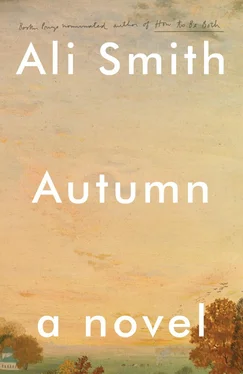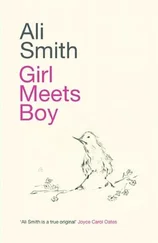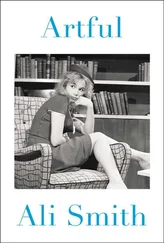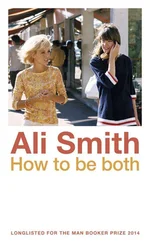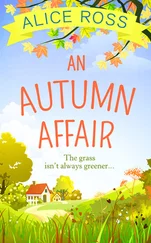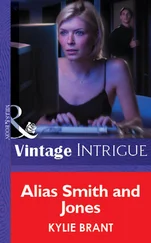He picks a green leaf off the branch by his head. He picks another. He puts their edges together. He stitches one to the other with a neat, what is it, running stitch? blanket stitch? Look at that. He can sew. Not something he could do while he was alive. Death. Full of surprises. He picks up a layering of leaves. He sits down, matches an edge to an edge and sews. Remember that postcard he bought off a rack in the middle of Paris in the 1980s, of the little girl in one of the parks? She looked like she was dressed in dead leaves, black and white photo dated not long after the war ended, the child from behind, dressed in the leaves, standing in the park looking at scattered leaves and trees ahead of her. But it was a tragic as well as a fetching picture. Something about the child plus the dead leaves, terrible anomaly, a bit like she was wearing rags. Then again, the rags weren’t rags. They were leaves, so it was a picture about magic and transformation too. But then again again , a picture taken not long after, in a time when a child just playing in leaves could look, for the first time to the casual eye, like a rounded-up and offed child (it hurts to think it)
or maybe also a nuclear after-child, the leaves hanging off her looked like skin become rags, hanging to one side as if skin is nothing but leaves.
So it was fetching in the other sense of fetch too, the picture, like a picture of your fetch , the one who comes to fetch you off to the other world. One blink of a camera eye (can’t quite put his finger on the name of the photographer) and that child dressed in leaves became all these things: sad, terrible, beautiful, funny, terrifying, dark, light, charming, fairystory, folkstory, truth. The more mundane truth was, he’d bought that postcard (Boubat! he took it) when he visited the city of love with yet another woman he wanted to love him but she didn’t, course she didn’t, a woman in her forties, a man in his late sixties, well, be honest, nearer seventy, and anyway he didn’t love her either. Not truly. Matter of profound mismatch nothing to do with age, since at the Pompidou Centre he’d been so moved by the wildness in a painting by Dubuffet that he’d taken his shoes off and knelt down in front of it to show respect, and the woman, her name was Sophie something, had been embarrassed and in the taxi to the airport told him he was too old to take off his shoes in an art gallery, even a modern one.
In fact all he can remember of her is that he sent her a postcard he wished afterwards he’d kept for himself.
He wrote on the back of it, with love from an old child.
He is always looking out for that picture.
He has never found it again.
He has always regretted not keeping it.
Regrets when you’re dead? A past when you’re dead? Is there never any escaping the junkshop of the self?
He looks out from the copse at the edge of the land, the sea.
Well, wherever it is I’ve ended, it’s given me this very swanky green coat.
He wraps it around him. It’s a good fit, it smells leafy and fresh. He would make a good tailor. He has made something, made something of himself. His mother would be pleased at last.
Oh God. Is there still mother after death?
He is a boy collecting chestnuts from the ground under the trees. He splits the bright green prickly cauls and frees them brown and shining from the waxy pith. He fills his cap with them. He takes them to his mother. She is over here with the new baby.
Don’t be stupid, Daniel. She can’t eat these. Nothing eats these, not even horses, far too bitter.
Daniel Gluck, seven years old, in good clothes he’s always being told how lucky he is to have in a world where so many have so little, looks down at the conkers he should never have sullied his good cap with and sees the brown shine on them go dull.
Bitter memories, even when you’re dead.
How very disheartening.
Never mind. Hearten up.
He’s on his feet. He is his respectable self again. He scouts around him, finds some large rocks and a couple of good-sized sticks with which he marks the door of his copse so he’ll find it again.
In his bright green coat he comes out of the woods, across the plain and back towards the shore.
But the sea? Silent, like sea in a dream.
The girl? No sign. The ring of dancers round her? Gone. On the shore, though, there’s a washed-up body. He goes to look. Is it his own?
No. It is a dead person.
Just along from this dead person, there is another dead person. Beyond it, another, and another.
He looks along the shore at the dark line of the tide-dumped dead.
Some of the bodies are of very small children. He crouches down near a swollen man who has a child, just a baby really, still zipped inside his jacket, its mouth open, dripping sea, its head resting dead on the bloated man’s chest.
Further up the beach there are more people. These people are human, like the ones on the shore, but these are alive. They’re under parasols. They are holidaying up the shore from the dead.
There is music coming out of a screen. One of the people is working on a computer. Another is sitting in the shade reading a little screen. Another is dozing under the same parasol, another is rubbing suncream into his shoulder and down his arm.
A child squealing with laughter is running in and out of the water, dodging the bigger waves.
Daniel Gluck looks from the death to the life, then back to the death again.
The world’s sadness.
Definitely still in the world.
He looks down at his leaf coat, still green.
He holds out a forearm, still miraculous, young.
It will not last, the dream.
He takes hold of one leaf at the corner of his coat. He holds it hard. He will take it back with him if he can. Proof of where he’s been.
What else can he bring?
How did that chorus go, again?
How many worlds
Handful of sand
It is a Wednesday,just past midsummer. Elisabeth Demand — thirty two years old, no-fixed-hours casual contract junior lecturer at a university in London, living the dream, her mother says, and she is, if the dream means having no job security and almost everything being too expensive to do and that you’re still in the same rented flat you had when you were a student over a decade ago — has gone to the main Post Office in the town nearest the village her mother now lives in, to do Check & Send with her passport form.
Apparently this service makes things quicker. It means your passport can be issued in half the time, if you’ve gone in with your form filled out and with your old passport and your new photographs, and had a certified Post Office official check it through with you before it goes to the Passport Office.
The Post Office ticket machine gives her a ticket with number 233 on it for counter service. The place isn’t busy, apart from the queue of angry people stretching out the door for the self-service weighing machines, for which there’s no ticketing system. But the number she’s been given is so far ahead of the numbers highlighted on the boards above everybody’s heads as coming up next (156, 157, 158), and it takes so long anyway for the lone two people behind the twelve counters to serve the people who are presumably numbers 154 and 155 (she’s been here twenty minutes and they’re still the same two customers) that she leaves the Post Office, crosses the green, goes to the second-hand bookshop on Bernard Street.
When she gets back ten minutes later the same two lone people behind the counters are still the only people serving. But the screen now says that the numbers coming up next for counter service will be 284, 285 and 286.
Elisabeth presses the button on the machine and takes another ticket (365). She sits down on the circular communal seating unit in the middle of the room. Something inside it is broken, so that when she does this something clanks inside its structure and the person sitting along from her is jerked an inch into the air. Then that person shifts position, the seat clanks again and Elisabeth jolts an inch or so downwards.
Читать дальше
